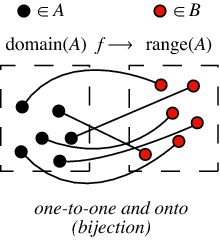Hannibal probably would be stuffed by now.
A bijection (above) relates everything in one group to exactly one element in the other group. A surjection is where everything in the second group is related to something in the first group, but not necessarily just one. An injection is where everything in the first group is is related to something in the second group, but not necessarily everything in the second group has a partner in the first group. For some reason, I was thinking of the relationship between this concept and our view of reality vs. what reality actually is.
Bijection would be all-knowing and without illusion, which (I hope obviously) isn't the case. But if A is the human mind, I don't think injection or surjection really exist, either, but maybe we do.
To put it a better way, can we imagine something that has no relationship to reality?
---
I already covered Blake's The Divine Image. But this post isn't about the divine image, it's about a divine image.
A Divine Image, rather than being the mercy in men is about the cruelty of men. By incorporating the merciful, peaceful imagery of God-is-Man in Songs of Innocence, while including this more fearful image of God-is-Man in Songs of Experience, I wonder what Blake was trying to suggest about the reality of human nature.
Do we believe in the universality of goodness because we want or need to believe in it? I'm not sure I have an answer to that.
Note that the dress is created by the form. In The Divine Image, peace is the dress and love is the form.
A Divine Image
By William Blake
Cruelty has a human heart,
And Jealousy a human face;
Terror the human form divine,
And Secrecy the human dress.
The human dress is forged iron,
The human form a fiery forge,
The human face a furnace sealed,
The human heart its hungry gorge.

The Blake poem is depressing, perhaps moreso because it may be true.
ReplyDeleteYeah, but maybe the other poem is just as true, too. :-) And what's awesome is maybe they're both true at the same time in the same people.
DeleteThis is my first visit to your web journal! We are a group of volunteers and new activities in the same specialty. Website gave us helpful data to work. Offshorededicated
ReplyDelete